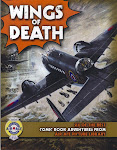Available now from Bear Alley Books
After my lazy week—reported last week—I have been doing my damnedest to drag myself back up to working speed and failing miserably. It's too warm and I still haven't got the balance right between windows, bedclothes and nightwear. I wake up tired and creaky and it takes a walk in the fresh air to get any vigour at all into my aching bones. I've usually reached some sort of equilibrium by my third coffee, at which point I can usually persuade myself to get the day's tasks started.
We all reach the point where we ask ourselves: "When did old age sneak up on me... and why the hell is it punching me repeatedly in the lower back?" Guess it's my turn this week.
On a more positive note, the second pass on the artwork for the next book continued and I pulled together a PDF of the whole story for the first time. And I've started pulling together disparate bits of research that will help with the introduction. And once I get a signed contract returned, I'll be able to tell you what the book is. Shouldn't be long now.
Mention of walks reminds me that the one or two amongst you following my attempts to lose a bit of weight might be cheered to hear that I'm starting to head in the right direction again after a couple of months fighting off a bit of a Christmas bounce. I've now lost over a stone since starting just over a year ago. The plan was (and remains) to lose weight at a pace where I can sustain the loss. It took me twenty years to put on five stone, so losing it over time by making lifestyle changes makes more sense than attempting some faddy diet or an exercise regime that isn't sustainable. I've achieved a level of exercise that I'm happy with, that I can fit around work and that seems to burn off more calories than I'm eating. It's slow but I don't care. And it means I can eat ice cream without feeling guilty.
Because I over-research everything, I've been aware of the 1 lb of fat = 3,500 calories formula from the beginning and it's fun to be able to say things like: "I've burned off 56,000 more calories than I've consumed in the last year." So I was a bit surprised to discover that the formula seems to be based on a series of approximations that could mean that, if you count calories and use that as the basis for your diet, you might find you're not losing the weight you want to lose.
I'm not a calorie counter. Nor do I eat any less than I used to. What I've done is replace some food with vegetation—mostly lettuce and tomatoes—which means that instead of, say, ham and cheese, I'll have one (ham or cheese) and some salad. That way I don't feel hungry, I've eaten something healthy and I've taken in fewer calories. And I've halved my cheese consumption, which is good for my blood-pressure (cheese is chock full of fat and sodium!).
"Suppressed in Russia... acclaimed as a masterpiece throughout the free world," says the blurb on the back cover of Fontana's first edition of Dr Zhivago by Boris Pasternak, along with four quotes, ranging from Edmund Wilson's New Yorker review ("Doctor Zhivago will, I believe, come to stand as one of the great events in man's literary and moral history") to V. S. Pritchett in New Statesman ("The first work of genius to come out of Russia since the revolution").
Pasternak's novel, Doktor Zhivago was completed in 1956 and submitted to the Soviet magazine Noby Mir, where it was rejected on the grounds that it was too concerned with the individual characters rather than the advancement of society. It was first published in Italy as Il Dottor Zivago in 1957 and the novel was quickly translated into English and published in 1958, spending 26 weeks on the New York Times bestsellers list.
Pasternak was awarded the Nobel Prize for Literature for the novel, which was circulated in its original Russian, reputedly in editions printed by the CIA in France. When the prize was announced, anti-Pasternak campaigns were organized and the author was told that, should he travel to Stockholm to collect the prize, he would be refused reentry into the Soviet Union. Pasternak sent a telegram turning down the prize... but that is not how an award works. The Swedish Academy awarded him the prize anyway.
The controversy over the novel weakened Pasternak's health and he died in May 1960, aged 70.
Fontana Books 485M, (Jan) 1961, 542pp, 5/-, [typo].
----, 2nd imp., Mar 1961; 3rd imp., May 1961; 4th imp., Oct 1961; 5th imp., May 1962; 6th imp., Nov 1963; 7th imp., Dec 1965.
Fontana Books 1354, [8th imp.] Apr 1966, 542pp, 7/6, [photo]. Movie Tie-In.
----, 9th imp., Jun 1966; 10th imp., Jun 1966; 11th imp., Oct 1966; 12th imp., Nov 1966; 13th imp., Jan 1967; 14th imp., Mar 1967; 15th imp., Apr 1967; 16th imp., Jul 1967; 17th imp., Oct 1967; 18th imp., Dec 1967; 19th imp., Mar 1968; 20th imp., Jul 1968.
Fontana Books 2198, [22nd imp.] 1969, 608pp.
----, 29th imp., Mar 1971, 608pp, 50p, [photo]. Movie Tie-In.
Collins & Harvil, 1966. Movie Tie-In.
I'm hoping to have a short piece about the children's author E. W. Hildick up in the next few days, along with some scans of a section from his A Close Look at Magazines & Comics, which is not an especially close or accurate look at comics. But it's interesting to see what this popular children's author thought of them.






























































No comments:
Post a Comment